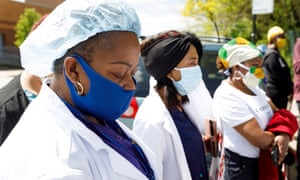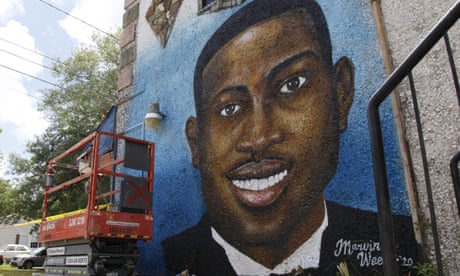The coronavirus has laid bare the reality of America's racial caste system
Generations after Brown v Board of Education, the US is still separate and unequal
Malaika Jabali Wed 27 May 2020

‘In the next 66 years, fulfilling the promises of Brown requires we re-imagine and re-think our social structures.’ Photograph: Justin Lane/EPA
In the same week civil rights activists celebrated the anniversary of the supreme court’s unanimous decision in Brown v Board of Education, the United States observed another milestone: nearing 100,000 deaths caused by Covid-19. Early data indicates that black Americans comprise a disproportionate number of the victims. Sixty-six years after Brown partially overruled the “separate but equal” doctrine – laying the foundation for black Americans to have equal access to better schools, healthcare, and housing – this pandemic has laid bare a harsh reality: the country is still separate and still unequal.

FBI investigating Ahmaud Arbery shooting as possible hate crime, lawyer says
https://www.theguardian.com/us-news/2020/may/25/ahmaud-arbery-shooting-hate-crime-fbi
In the same week civil rights activists celebrated the anniversary of the supreme court’s unanimous decision in Brown v Board of Education, the United States observed another milestone: nearing 100,000 deaths caused by Covid-19. Early data indicates that black Americans comprise a disproportionate number of the victims. Sixty-six years after Brown partially overruled the “separate but equal” doctrine – laying the foundation for black Americans to have equal access to better schools, healthcare, and housing – this pandemic has laid bare a harsh reality: the country is still separate and still unequal.

FBI investigating Ahmaud Arbery shooting as possible hate crime, lawyer says
https://www.theguardian.com/us-news/2020/may/25/ahmaud-arbery-shooting-hate-crime-fbi
At least 20,000 black Americans have died from the virus. Their death rate is nearly 2.5 times higher than whites, and it has never been less than twice that of Latinos and Asians, according to recent data compiled by APM Research Lab. Despite comprising 13% of the country, they make up 25% of Covid-19 deaths.
The Trump administration has placed much of the responsibility for these disparities on victims. Public officials have speculated about the victims’ smoking and drinking habits and made insinuations about their diets and lifestyle choices. There has been no contemplation, however, of the underlying conditions of America’s racial caste system, the one rooted firmly in this country’s soil.
While Brown laid the ground for desegregating the United States, this country was built on a far more entrenched foundation of white supremacy. African Americans have been deemed property longer than we have been considered citizens. Our wealth and resources have been extracted longer than we have been able to accrue or maintain them. The intentional, overt practice of white supremacy has endured longer than it has been unconscious and covert, or talked about in academic circles as microaggressions and racial privilege. It has been 66 years since the highest court in the land asserted that segregation in public schools was inherently unequal – and 400 years of America proving its assertions of liberty and equality are lip service.
Centuries of white supremacy have meant that black workers and white ones do not earn the same wages, buy the same types of houses or have the same nest eggs to pass down to their kids. It has meant private acts of racism and government-sanctioned racism, often in tandem. It has meant less access to quality public schools, higher education, or high-paid jobs that require expensive, advanced degrees. It means more grocery stores in affluent white urban neighborhoods, and fewer healthcare services for the black and dispossessed. It means black Americans rely more heavily on public transit, are less able to work from home, and are over-represented in “essential” jobs. It means more exposure to Covid-19. It means 20,000 deaths.
The Trump administration has placed much of the responsibility for these disparities on victims. Public officials have speculated about the victims’ smoking and drinking habits and made insinuations about their diets and lifestyle choices. There has been no contemplation, however, of the underlying conditions of America’s racial caste system, the one rooted firmly in this country’s soil.
While Brown laid the ground for desegregating the United States, this country was built on a far more entrenched foundation of white supremacy. African Americans have been deemed property longer than we have been considered citizens. Our wealth and resources have been extracted longer than we have been able to accrue or maintain them. The intentional, overt practice of white supremacy has endured longer than it has been unconscious and covert, or talked about in academic circles as microaggressions and racial privilege. It has been 66 years since the highest court in the land asserted that segregation in public schools was inherently unequal – and 400 years of America proving its assertions of liberty and equality are lip service.
Centuries of white supremacy have meant that black workers and white ones do not earn the same wages, buy the same types of houses or have the same nest eggs to pass down to their kids. It has meant private acts of racism and government-sanctioned racism, often in tandem. It has meant less access to quality public schools, higher education, or high-paid jobs that require expensive, advanced degrees. It means more grocery stores in affluent white urban neighborhoods, and fewer healthcare services for the black and dispossessed. It means black Americans rely more heavily on public transit, are less able to work from home, and are over-represented in “essential” jobs. It means more exposure to Covid-19. It means 20,000 deaths.
The disproportionate death rates in some states are astounding, with large margins dotted all over the map. In Washington DC, black people are 44% of the population, yet 80% of coronavirus deaths. In South Carolina, they make up 27% of the state and 56% of its deaths. Black people in Michigan and Missouri are 14% and 11% of the population – and 42% and 39% of Covid-19 deaths, respectively.
More studies are necessary to determine the precise cause of these disparities. Public health research has to assess why certain comorbidities, such as hypertension, may be more present in black Americans than other groups, and move past stereotypical assumptions.
The more difficult assessment, however, is what to do in the future, after the worst cases subside and the pandemic wanes. There must be a commitment not to return to normal, with black workers continuing to be the sacrificial lambs of white American liberties and corporate profiteers.
In the next 66 years, fulfilling the promises of Brown requires we reimagine and rethink our social structures. This reconsideration requires shedding the entrenched individualism that allowed white landowners to equate human suffering with their rights to enslave. It must challenge a culture that permits white liberals to claim they are in favor of integrating high-opportunity neighborhoods while fighting rabidly to prevent it when it hits their doorsteps. It requires ending the fanatical obsession with corporate profits that pushes a disproportionate number of black people to their deaths faster – whether in risky warehouses during a pandemic or the temporary and low-wage jobs that lack health benefits, paid time off and sick leave. It requires governments that provide adequate social services safety nets.
Most of all it requires a fight, because none of this will happen without one. While the Trump White House and Republican legislators loot the country’s treasury for bank and business bailouts, conservative state governments and their rightwing constituents rabidly demand that the country “reopen”. Conservatives’ long-time verbal commitments to being anti-abortion – like commitments to democracy and equality since this country’s founding – have been easily abandoned in the interests of individual convenience. And leaders of the corporate, liberal wing of the two-party system have done relatively little to challenge it.
Twenty-first century concerns about gentrification and displacement complicate the desegregation narrative; people of color in New York City, for instance, have asserted that equal access to opportunities is most important to them, regardless of the racial composition of their neighborhoods. Nevertheless, Covid-19 has clarified the fortitude of America’s racial caste system. Generations after Brown, inequality is still very much the law of the land. But the chance remains to create another precedent.
Malaika Jabali is a freelance writer, activist and attorney
No comments:
Post a Comment